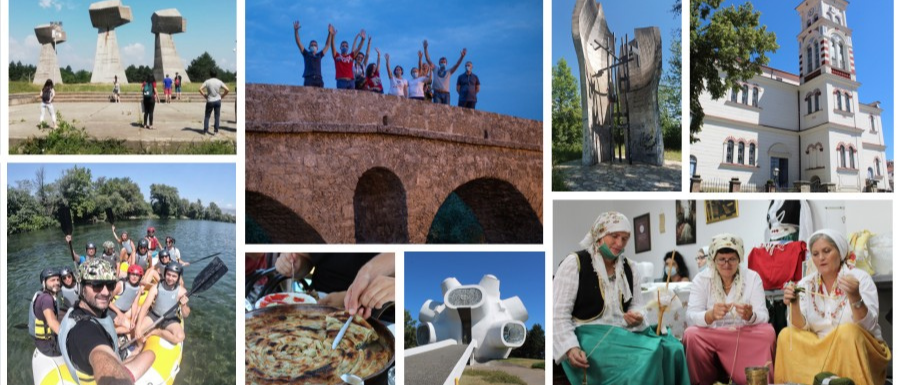If you come from, or know, the Western Balkans, have you ever wondered what Konjic, Brezovica, Uzice or Sid have in common? The answer is that they all have exquisite post-WW2 monuments as part of their cultural heritage.
This summer, young bloggers, greeters and touristic workers are having the opportunity to visit different parts of these cultural heritage sites in the Western Balkans, where the local Local Democracy Agencies (LDAs) are proposing three different tours around Bosnia and Herzegovina, Kosovo, Montenegro, Serbia and North Macedonia within the “Monumental 9” project.
First, a tour of Bosnia and Herzegovina and Montenegro includes visits to Tito’s bunker in Konjic, the Battle of Neretva Memorial in Jablanica, the Partisan cemetery in Mostar and the Trebjesa Memorial site near Niksic. The Monument Brezovica in Kosovo, Makedonium in Krusevo (North Macedonia) and Bubanj Memorial Park in Nis (Serbia) follow in the second tour. The last itinerary, finally, goes from the Kadinjaca Monument site in Uzice through the Sremski Front memorial park in Sid and ends with the Kozara Monument in Prijedor.
In thisexciting discovery experience dipped in rich history, the young bloggers and greeters involved have the opportunity to film while boating on the marvelous Jablanica Lake or document the local artisanal production of cheese and coffee – as not only the history of the monuments is important, but its connection with the beautiful local nature and its valuable produce, too. How to forget the Balkanic traditional and fine industries such as knitting in Jablanica or crafting your own bracelets in Mostar, not to mention the varied and tasteful local gastronomy?
This touristic offer of the WW2 cultural heritage of the Western Balkans collected by the Monumental 9 project will soon be presented on a new website, showcasing all those attractive places for everyone to see. Stay tuned!
Monumental 9 is supported by the Regional Cooperation Council and implemented by ALDA’s Skopje office and Western Balkan LDAs.
